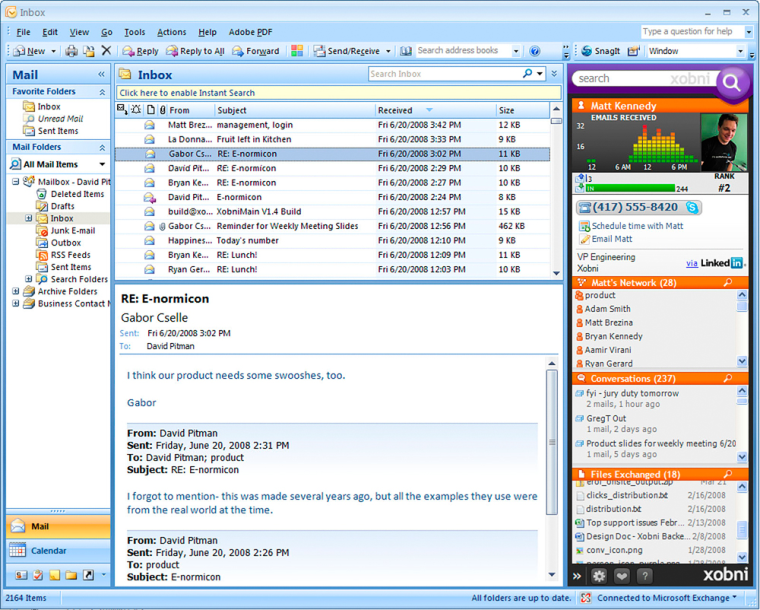Remember when "You've got mail" alerts were thrilling?
The e-mails that now pour into office inboxes and spill onto BlackBerry devices have left some workers feeling so bogged down with online messages that they can find little time to do anything else.
"We're like frazzled lab rats, being poked and prodded and beeped and pinged," says Maggie Jackson, author of "Distracted: The Erosion of Attention and the Coming Dark Age."
The average worker receives 200 e-mails a day, according to the business and technology research firm Basex in its report "Information Overload: We Have Met the Enemy and He Is Us."
It's an unfortunate irony that a system once lauded for its promises of efficiency has filled days at the office with wasted, fragmented time. Basex found that e-mail and other interruptions decrease U.S. productivity at a cost of more than $650 billion per year for billions of lost man hours.
Constant access to information, communication and technology has becomes such a big issue, experts say, that its implications go beyond a lack of productivity and focus at work. E-mail and information overload also eats into the quality of work relationships as well as those at home.
"Attention is the bedrock to learning, memory, social connection and happiness," Jackson says.
But office culture has developed to reward immediacy over focus, so that attending to what's new at any given moment takes precedence over long-term goals. The result? A series of interruptions, such as e-mail, that get in the way of the big-picture goals.
Checking e-mail can also be an all-too-tempting alternative to actual work. And like any form of procrastination, sometimes taking care of e-mail just feels so good.
"E-mail is being used like a drug to get a hit of accomplishment when one feels he is spinning his wheels," says technology analyst Craig Roth in his blog, KnowledgeForward.
In July, the Information Overload Research Group, a nonprofit with members from technology companies and other industry experts, was launched with the mission to raise awareness of how current communication tools can impede productivity.
And the industry that created this problem is also trying to capitalize by helping people organize their inboxes. A program called C-MAIL promises to help prioritize e-mail by learning through the user's clicks about what's more or less important. The makers of Xobni, which is "inbox" spelled backwards, say their Microsoft Outlook plug-in speeds up the process by "threading" conversations (grouping responses together).
Productivity gurus have also created a cottage industry out of e-mail overload. Here's the best of their advice:
1) Don't check e-mail in the morning. Experts say you should take care of an important task first thing before checking e-mail, so that you don't use it as an excuse for postponing more pressing obligations.
2) Check it in batches, rather than fluidly throughout the day. Some experts suggest checking it twice a day. Others, up to five times. But the important thing is efficiency.
"You wouldn't do a new load of laundry every time you have a dirty pair of socks," says Timothy Ferriss, author of "The 4-Hour Workweek."
3) Minimize exchanges. "Learn to propose, instead of asking questions," Ferriss says. Instead of asking what time a person can meet for lunch, just jump right in and propose a few times. You can use "if, then" language, for example, "If you can't meet at 11, how about 12?"
4) Unsubscribe to lists or newsletters you don't read. Experts say that if you notice you're not actively reading a newsletter or other e-mail subscription service, it's time to unsubscribe.
5) Stop sending e-mail. Sending less e-mail means receiving less e-mail, and sending shorter e-mails will garner shorter responses.
"This does not mean that you should write elliptically or bypass standard grammar, capitalization, and punctuation," says Merlin Mann on his productivity blog 43 Folders. "Just that your well-written message can and should be as concise as possible."
6) Take it to zero. In an extreme case, some experts suggest wiping the Inbox completely away, and starting fresh. You can always send your contacts an e-mail telling them what you've done, and to resend any truly important messages.
7) Set precedents from above. If you're a boss, you might think again about sending an e-mail late at night on a Saturday or other non-work times unless it's truly urgent. Even if you don't intend for your employee to respond right away, you are still sending the message that work e-mail is not just for work hours, which can contribute to overload.
8) Use other forms of communication. E-mail has earned a solid place in the office, but in some cases it's not the most appropriate form of communication.
"When you're overusing it for the petty things — like the guy in the next cubicle — stand up and ask him the question," says Cherie Kerr, author of "The Bliss or 'Diss' Connection: E-mail Etiquette for the Business Professional."
She suggests picking up the phone if an e-mail thread gets longer than three back-and-forths.
"I don't care how many pieces of technology we have," she says. "At the end of the day, it's always going to be about relationships."
